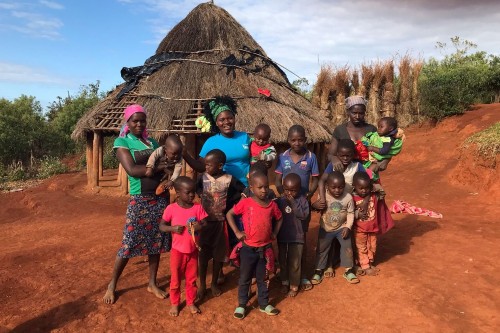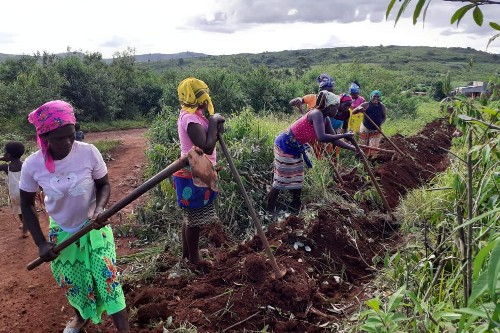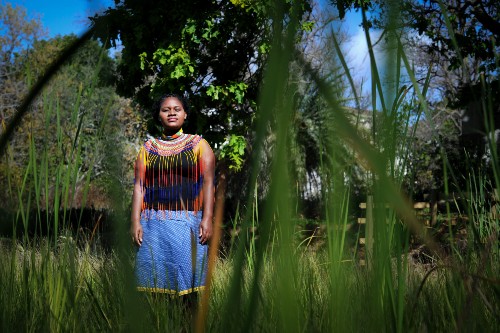When Bongai Munguni, a University of Bristol and University of Cape Town joint PhD scholar, asked Bristol people to help get running water to her village for the first time, they stood up to help in their droves.
With the £3,500 raised - combined with a small loan and £4,500 of Bongai’s own money, saved from her university stipends - Bongai and her family were able to sink a borehole into the ground and connect hundreds of families to running water for the first time.
Nearly all of the adult men in Chizango work in abandoned mines in South Africa, leaving the village’s women to farm the maize fields, look after the homes and raise the children.
Until now, the women had to walk two hours a day to fetch water from a dirty stream, carrying 20 litres of water at a time on their heads, often with babies strapped to their backs.
Now they not only have safe drinking water but can spend more time harvesting their crop, looking after their children and planning ahead for the village.
But the benefits have not just stopped there.
“We are so proud to have running water: we never dreamed of this, we never knew that having water at home was so important,” said Bongai, who won a scholarship from Bristol and Cape Town’s ‘Researchers without Borders PhD Programme’.
“It’s not just having running water for the first time, these kind acts have changed everything for our village. Our whole lives, our whole mindset, has changed.
“We now want to change every part of our lives and help people in other villages too. Thank you, thank you, thank you Bristol.”
The money raised by Bristolians helped pay for a 43 metre borehole that levies 25,000 litres of water a day; a pump to bring that water to the surface; and solar panels so it can be run off-grid, as the village does not currently have electricity.
They now plan to:
- Create a nursery and play area for their children for the first time.
- Build a school that teaches the British Cambridge curriculum from ages eight up to very old. The school will be free for those who cannot pay. Around 90% of people in the area aged over nine cannot read or write.
- Develop a technical college to learn trades (electrician, construction etc) and a university (by 2030) that serves the whole region.
- Bring in experts to teach them new farming techniques (for instance fish farming) to reduce reliance on their mostly Maize diet and give them new business opportunities.
- Start a social enterprise to take the skills they learn building the school and selling their new produce to other villages in the area.
- Begin replacing their one-room mud and branch homes with sturdier brick houses.
“This money has completely transformed our village. We now think in a different way,” Bongai said.
“At 15 most of the men go to work in dangerous mines, while the women stay at home and work in the fields. We have lost many of our brothers in those mines.
“Now for the first time things are changing. We have bought land to build the school and we hope people from all over will come to learn.
“We have always been subsistence maize farmers. Now we have the chance to learn new ways of farming, which we will take to other villages in Mozambique, so they can start businesses and sell their surplus.
“Our hopes have been renewed, our aspirations changed and the way we view the future is now different and great!”
Ann Powell, a retired nurse/nutritionist, and husband Steve Powell, a retired farmer, both from Bristol, plan to visit Chizango to teach them their skills.
Bristol locals Rob Walrond, Avril Chadwick and Jenny and David Cobbolds, who have helped since the beginning of the borehole project, have also committed to help in any way possible.
Bongai is part of Bristol’s School for Policy Studies, where she researches the impact of poverty, particularly on women.
As a child, she walked eight hours every day to go to primary school and did her homework by the light of fires in her Mozambique village.
She studied for secondary education in the evenings and small hours, rising early each morning to work on a tea plantation.
The courageous student and human rights advocate will graduate from Bristol and UCT in two years’ time with a PhD from each.
Afterwards she hopes to become a professor - perhaps via post-doc work at Harvard or Oxford - as well as a social entrepreneur.
Bongai and her village are still welcoming donations so they can connect more local families to running water and to help finance the school. Click here to donate.


